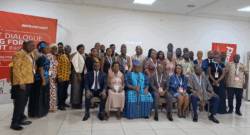Africa’s food environment researchers will deliberate on the impact of multiple pandemics of malnutrition, climate change, and currently COVID-19 on food environments and the food systems at the 2nd Africa Food Environment Research Network (FERN) Meeting, slated for November 10 -12, 2021.
The 2nd FERN virtual meeting will build on the progress made from the first meeting, and leverage research, practice, and policy-making networks to contribute to the transformation of Africa’s food environments and food systems as a whole.
The event will be held jointly with the International Network for Food and Obesity/Non-communicable Diseases Research, Monitoring and Action Support (INFORMAS)’s e-symposium series.
The impact of the multiple pandemics of malnutrition–including undernutrition, and obesity– climate change, and currently, COVID-19 – on our food environments and the food systems in general is immense.
These challenges require urgent attention. Addressing the challenges, malnutrition in all its forms, will require improvement in food environments and a food system that works for all.
In Africa, improving food environments is an urgent priority. Rapid urbanization, coupled with changes in food environments, has impacted the burden of obesity and diet-related Non Communicable Diseases in the region.
Dietary habits of people in Africa are shifting towards highly processed foods that are high in fat, sugar and salt.
Africa needs policies and practice guidance designed to create supportive food environments for healthy food choices. To be successful, food systems stakeholders led by governments require inputs – including data, evidence, nudging.
Given this background, the FERN2021 and the INFORMAS eSymposium series for the sub-Saharan region will take place virtually from the 10th-12th of November 2021.
Kick-starting with the eSymposium on November 10, 2021, the event format will be half-day meetings with pre-recorded and live presentations, discussions and workshops.
As with the previous FERN, participants will share experiences, best practices, methodologies, challenges and opportunities for improving research on food environments and related policy in Africa.
The meeting will also serve as a regional platform for food, nutrition and health policy experts, academia, governments, civil society, non-governmental organizations and health-promoting private sector to foster collaboration towards transforming the food systems on the African continent.
Sessions will include a debrief following the United Nations Food Systems Summit by country representatives.










